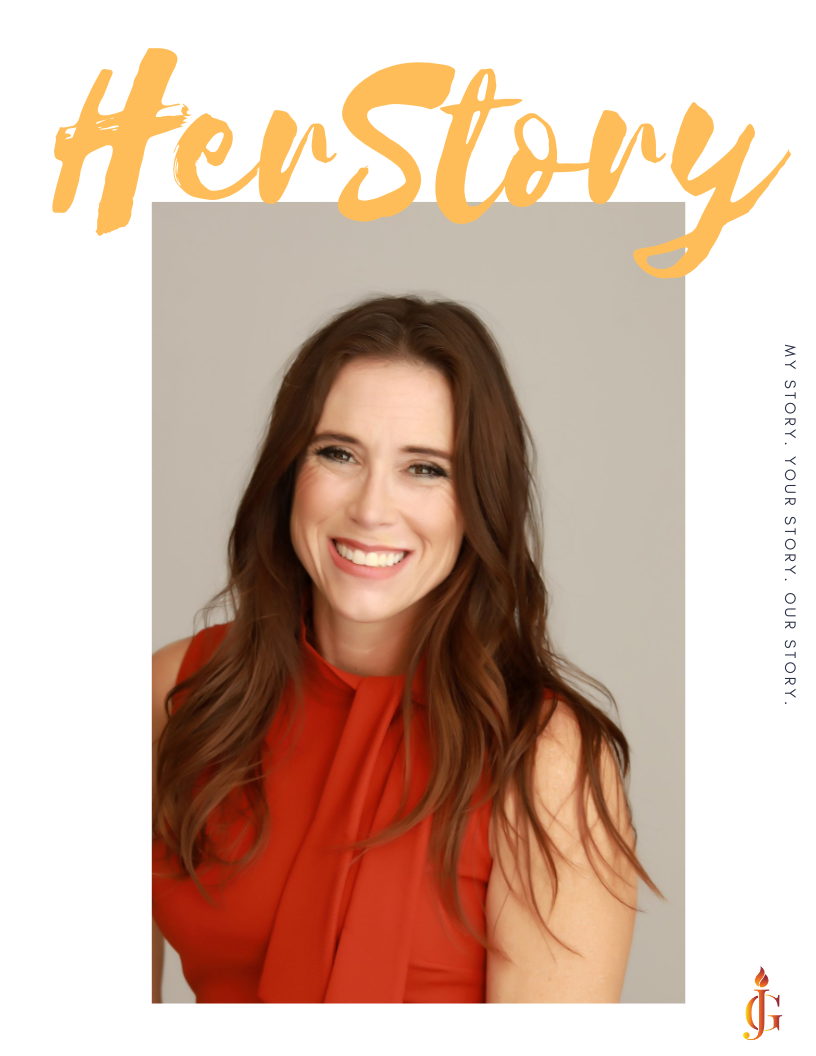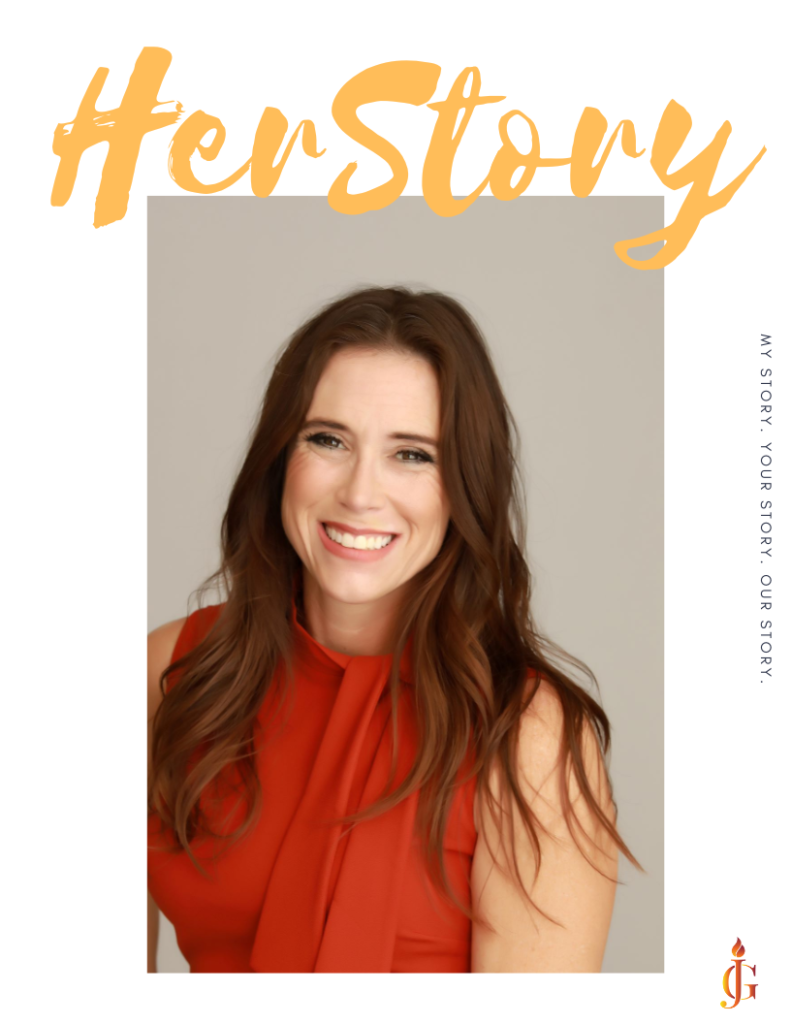
05 May HERStory: Tiffany Jameson
 Tiffany Jameson, MBA, PHR, Global Neurodiversity Speaker & Champion, Mama Bear
Tiffany Jameson, MBA, PHR, Global Neurodiversity Speaker & Champion, Mama Bear
I am a California native and am lucky to have my parents still together and happily married for over 50 years! I have one older sister and we grew up with an entrepreneur dad and a stay-at-home mom. I feel I got the best of both worlds having a loving mother there for me, but also a father who encouraged me to go after my dreams. With two girls, my dad never treated us like we weren’t capable. The opposite. Sometimes the opportunity we were given was overwhelming!
We were never pushed for straight A’s, sports, or anything you hear of these days. We spent most of our weekends on the beach as a family. Me, doing gymnastics all day long. Personally, I was always driven to challenge myself and I started gymnastics and competed for a bit. I absolutely loved it. This continued to fuel me and my desire to be out in front. I became drill team captain in junior high, leader in our advanced dance, song leader co-captain, president of girls’ league, and active in the student body. I just like being BUSY.
What many people don’t know about me is how uncomfortable I was in my own skin in high school. I was accomplished. On courts for princesses every year. But I never felt like I could connect with anyone effortlessly. It wasn’t until I took a computer applications class and computer programming that I felt I was in the right place. For that one hour of the day in high school, I felt engaged, accepted, and living my true self. I am grateful my school had this offering back in 1990!
I used this new love and went to Chapman University as a computer science major. No, there weren’t many females. I never really thought about it, nor cared. I always connected to people based on interests and values, more than any other characteristics such as gender or ethnicity.
I LOVED COLLEGE! I loved all the different classes. The acceptance for who you were without trying to fit into a small circle like high school. I joined a sorority (gamma phi beta) and, surprisingly, became President. I started a rollerblading club and at one time I was President of the President’s club! I come alive when I’m out in front and I have continued this trend my whole life.
But I also love quiet. What I have learned about myself after marriage and two neurodivergent kids, is the peace one can find from being deeply engrained in a cognitive task. So, I guess you can say, I’m either out in front or quiet in a corner. But I’m okay with that.
My first two jobs out of college were in technology in 1996. Instead of feeling like I was the only woman, I looked at it as, “get out of my way and listen to me… I know what I’m talking about.” I graduated early from college, so I was a senior product manager in a software company at 23 presenting to CIOs of Fortune 500 companies, and it didn’t even phase me!
When my son was diagnosed autistic, I went through an identity crisis. I was already having a hard time being “just a MOM” after an extremely fast-based career. I felt like I lost my identity. Now, I had a child that needed more so I did what I do best, and dove in. Jake is doing fantastic now and is almost 21, and currently in college. But I paid a price for my taking the charge attitude. When you are single, you can run circles around people because no one else is expecting anything. When you are a mom and have a family, you can’t function like that without burning out. I put so much pressure on myself to get Jake what he needed that I burnt out and ended up in the hospital. At this time, I also had a new daughter. It took me some time to accept my limitations and to understand the pressure I was placing on myself. I was trying to be everything to everyone.
Tiffany’s work in Neurodiversity
Neurodiversity, in the context I’ll be speaking, is a social movement promoting the use of a strengths-based view of neurological differences like autism, ADHD, dyslexia, dysgraphia, Tourette’s, OCD and such. Some people include many conditions that also fall under mental health such as bipolar and schizophrenia.
We talk about neurodiversity as a reference to supporting and embracing individuals that think and behave differently than we expect people to. Things like sitting still and listening, making eye contact while speaking with someone, or people able to give compliments when meeting someone come naturally, but for many, these things are far from natural.
Last year, we ran a whole month-long blog series on autistic women- written by an autistic. https://www.gritandflow.com/blog/categories/autistic-womexn
So many young women were not diagnosed with a neurodivergent condition and the damage to these women is significant. The emotional toll of being told you aren’t a good girl, why can’t you do that like Mary, why can’t you sit still? These statements during childhood created an intense number of women that practice camouflaging or masking.
To camouflage or mask is to put on an act to fit in. To hide your true self and be what others expect you to be. Many women do it, especially neurodivergent, and their mental health suffers in the long run.
To help clarify – this is what the woman wrote me on LinkedIn:
“Growing up, my parents believed that ADD and ADHD was made up as an excuse for rowdy children. So not only do I struggle with my brain as my thoughts ping around like a pinball machine (you know, aiming for something but hitting everything else and in the completely wrong order!), but I have a lot of emotional damage from being told things like “Why do you always forget what I just told you?” and “Stop twitching, you need to control yourself.” Twenty-six years of my life, and I finally feel heard. “
I get these stories a lot because my LinkedIn Learning courses hit home with people and they feel validated.
Not given access to support through acceptance and accommodations.
Not given the opportunity for self-understanding and acceptance.
A significant number of mental health challenges resulted from the lack of or late diagnosis for many.
The stigma of how neurodivergent conditions affect boys – women are seen as rude, bitchy, airheads
How can others help or support these women?
Bring education into your organization. Help people understand the spectrum of ways neurodivergent conditions impact people and learn to be an ally. Focus on creating a culture of inclusion allowing everyone to work in a way that allows them to bring their best selves to the job.
Is there anything else you’d like to share?
Don’t apologize for being yourself. Not everyone will accept you when you are feeling most comfortable – but you have to live in your own skin. I decide every day to be me, and not let society around me tell me how I should be feeling. The world is loud, and it takes confidence to drown out all the opinions… but your opinion of yourself matters most.

No Comments